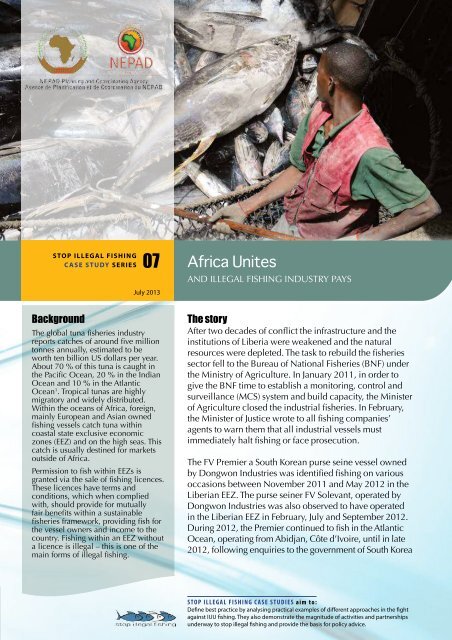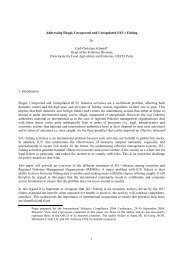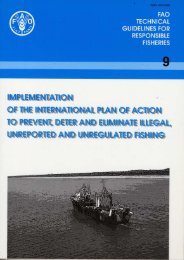Stop Illegal Fishing Case Study Series 7 - International MCS Network
Stop Illegal Fishing Case Study Series 7 - International MCS Network
Stop Illegal Fishing Case Study Series 7 - International MCS Network
You also want an ePaper? Increase the reach of your titles
YUMPU automatically turns print PDFs into web optimized ePapers that Google loves.
S TO P I L L E G A L F I S H I N GC A S E S T U DY S E R I E S 07July 2013Africa UnitesAND ILLEGAL FISHING INDUSTRY PAYSBackgroundThe global tuna sheries industryreports catches of around ve milliontonnes annually, estimated to beworth ten billion US dollars per year.About 70 % of this tuna is caught inthe Pacic Ocean, 20 % in the IndianOcean and 10 % in the AtlanticOcean 1 . Tropical tunas are highlymigratory and widely distributed.Within the oceans of Africa, foreign,mainly European and Asian ownedshing vessels catch tuna withincoastal state exclusive economiczones (EEZ) and on the high seas. Thiscatch is usually destined for marketsoutside of Africa.Permission to sh within EEZs isgranted via the sale of shing licences.These licences have terms andconditions, which when compliedwith, should provide for mutuallyfair benets within a sustainablesheries framework, providing sh forthe vessel owners and income to thecountry. <strong>Fishing</strong> within an EEZ withouta licence is illegal – this is one of themain forms of illegal shing.The storyAfter two decades of conict the infrastructure and theinstitutions of Liberia were weakened and the naturalresources were depleted. The task to rebuild the sheriessector fell to the Bureau of National Fisheries (BNF) underthe Ministry of Agriculture. In January 2011, in order togive the BNF time to establish a monitoring, control andsurveillance (<strong>MCS</strong>) system and build capacity, the Ministerof Agriculture closed the industrial sheries. In February,the Minister of Justice wrote to all shing companies’agents to warn them that all industrial vessels mustimmediately halt shing or face prosecution.The FV Premier a South Korean purse seine vessel ownedby Dongwon Industries was identied shing on variousoccasions between November 2011 and May 2012 in theLiberian EEZ. The purse seiner FV Solevant, operated byDongwon Industries was also observed to have operatedin the Liberian EEZ in February, July and September 2012.During 2012, the Premier continued to sh in the AtlanticOcean, operating from Abidjan, Côte d’Ivoire, until in late2012, following enquiries to the government of South KoreaS T O P I L L E G A L F I S H I N G C A S E S T U D I E S a i m t o :Define best practice by analysing practical examples of different approaches in the fightagainst IUU fishing. They also demonstrate the magnitude of activities and partnershipsunderway to stop illegal fishing and provide the basis for policy advice.
The story(cont’d)and media coverage of suspected illegalshing on the <strong>Stop</strong> <strong>Illegal</strong> <strong>Fishing</strong> website, itrelocated to the Indian Ocean, arguably inan attempt to escape justice. The LiberianGovernments investigation into both thePremier’s and the Solevant’s activities wasconcluded in February 2013 with chargesmade to both vessels for violations of theLiberia Fisheries Regulations includingshing without a licence.At this time several coastal states of theIndian Ocean were launching the FISH-iAfrica Task Force an initiative of <strong>Stop</strong> <strong>Illegal</strong><strong>Fishing</strong>, supported by the Pew CharitableTrusts, with the purpose of enabling targetedenforcement actions against illegal shingoperators through coordinated analysis anduse of intelligence and information. TheTask Force was aware of the investigationsinto the Premier and were anticipating itsarrival in December 2012 in Port Louis,Mauritius. In response to a request by theLiberian government the Mauritian Ministryof Fisheries inspected the vessel and providedcopies of the shing catch log and a forgedLiberian shing licence to Liberia.In early 2013, while the investigationremained open the FISH-i Africa countriesshowed support to Liberia and action againstIUU shing:• During the period from January to March,Kenya and Mozambique denied thePremier a shing license to operate in thewaters under their national jurisdiction;• In March, Seychelles, based on theIndian Ocean Tuna Commission (IOTC)Port State Measures Resolution (PSMR) 2 ,denied the Premier permission to ofoadits catch in Port Victoria;• In April, Tanzania denied to renew thePremier’s shing licence;• Throughout, Comoros stated its intent todeny the Premier any application for ashing licence; and• On the 19 April the vessel returned toMauritius and requested to ofoad itscatch, this request was denied by theMinistry of Fisheries.The Premier was by then a notorious IUUshing vessel. Liberia’s action followed by theallegiance of the FISH-i Africa countries andMauritius led to over 50 international pressstories, numerous blogs, tweets, Facebookcomments and activists painting the word“illegal” on the hull of the vessel. Africa andthe world made it clear that until the ne waspaid – the Premier was not welcome, nor wasits sh wanted.On the 22 April 2013, the owners of the vessel,South Korea’s Dongwon Industries paid theLiberian government two million US dollars insettlement of the charges against the FV Premierand the FV Solevant. The Mauritian governmentdid not allow the Premier to ofoad in PortLouis as it did not want potentially illegal shto enter its market: she eventually ofoaded inMay in Colombo, Sri Lanka before sailing backhome to South Korea.DriversThe main driver for action was the need to stop the damaging effects of illegal shingon African societies and resources and to demonstrate to shing vessel operators thatthey cannot act with impunity in African waters. The Conference of African Ministers ofFisheries and Aquaculture (CAMFA) in 2010 recommended ‘that monitoring, control andsurveillance systems and regional cooperation should be strengthened and that urgentactions at national and regional levels are required to deter and eradicate IUU shing’ – asa result countries, such as Liberia, took national action while the countries of the IndianOcean and their partners responded by forming FISH-i Africa.
Lessons learned• Providing intelligence analysis and regularinformation to countries within a supportframework such as FISH-i Africa can resultin national actions against illegal operatorsthat place a nancial burden on operatorsmaking illegal shing less protable.• Engaging the legitimate industry and marketStates provides an opportunity for supportand further pressure on illegal operators thatforces ag States to full their obligationsin respect of the vessels entitled to y theirags.• Legal frameworks require furtherstrengthening through the inclusion ofa Lacey Act type provision into nationalsheries legislation to enable States toconduct sheries law enforcement actions(including initiate administrative or judicialproceedings) for breach of laws andregulations having taken place under anotherState’s jurisdiction; and to develop regionalsheries instruments to strengthen regionalcooperation in sheries law enforcement.• Global information and intelligenceexchange and cooperation is required asvessels move from one ocean to another andsh is transported and traded internationally.• Timely publishing of the case in the mediahelps to send a message to other IUU shingoperators, to encourage action by the agStates and to gain international and popularsupport for the case.Key features and outcomes• Effective pan-African cooperation – demonstratedthat no matter where the Premier went, it was heldresponsible for its illegal shing actions.• Payment of two million US dollars settlementto Liberia – demonstrated that when the costof illegal shing becomes too high, owners areforced to play by the rules.• On-going media coverage and press releases– placed on the <strong>Stop</strong> <strong>Illegal</strong> <strong>Fishing</strong> and BNFwebsites 3 including countering false accusationsmade against Liberia generated global support.• The UK and other EU States imposed extrainspections and restrictions on tuna imports fromWest Africa – based on increased evidence andexposure of IUU shing activities.• Legitimate industry did not want any real orperceived connection to Dongwon – this helpedto stop the ofoading of Premier’s catch in PortLouis, while in Thailand buyers were reported to beavoiding Dongwon sh for the European market.• South Korea amended its Fisheries law tostrengthen penalties against its distant watervessels that sh illegally – due to the harmfulmedia coverage of Dongwon and a recentwarning from the United States for a possibleimport ban on South Korea’s sheries products.• Application of the regional legal framework – thestrict IOTC PSMR, based on the FAO Port StateMeasures Agreement (PSMA) provided the legalframework for actions that were taken.• Strengthening FISH-i Africa – the critical rolethat the FISH-i Africa Task Force played in thePremier case, drew awareness to the benets ofexpanding this group and in May 2013 Mauritiusand Madagascar joined the Task Force.Challenges• Limited human capacity within <strong>MCS</strong> agencies– if the enforcement ofcers with adequateknowledge, experience and understanding wereunavailable, delays in decision making occurred.• Communication and exchange between Liberiaand FISH-i Africa countries – were at times testingas this was a pioneer exercise with no establishedprocedures or protocols.• Lack of internationally coordinated police effortto investigate corruption and fraud issues – thevessel was denied access to port and charged withillegal shing, but the forgery of licenses and otherState communications were not fully investigated.• Unclear legal framework with regard to dealingwith vessels with an IUU shing history –presented challenges for interpretation anddecision-making.Players involved• Liberian Bureau of National Fisheries andMinistry of Agriculture: initiated legalproceedings against the Premier and prosecuted itfor illegal shing activities in Liberian waters withthe support of the West Africa Regional FisheriesProject.• <strong>Stop</strong> <strong>Illegal</strong> <strong>Fishing</strong>: a working group of theNEPAD that provides facilitation and advice to allAfrican countries including the FISH-i Africa TaskForce with respect to illegal shing.• Analytical Unit of the Trygg Mat Foundation:identied the illegal shing activities by thePremier in the Liberian EEZ, tracked the Premier’smovements throughout this case keeping countriesone step ahead of the vessel.• Coastal States of FISH-i Africa: Comoros, Kenya,Madagascar, Mauritius, Mozambique, Seychellesand the United Republic of Tanzania sharedinformation and collectively denied licensing,
landing of catch and port services to the vessel.• Pew Charitable Trusts: through their End <strong>Illegal</strong><strong>Fishing</strong> Project provides nancial and technicalsupport to FISH-i Africa and supported the TaskForce’s engagement in this case.• FISH-i Africa partners: including the IOTC,the Indian Ocean Commission’s SmartFISHprogramme and others provided advice andinformation to the Task Force.• <strong>International</strong> organisations and media: supportedthis case through their media campaigns, protestsand investigations into Premier’s owners, puttingfurther pressure on the owners.• Market states and the legitimate industry: sent aclear message to all that they did not want to haveany association with potentially illegal sh.Next stepsIn order to facilitate further continental cooperation,future efforts should focus on:• Strengthening of the FISH-i Africa Task Forceand extending its reach to West Africa andstrengthening <strong>Stop</strong> <strong>Illegal</strong> <strong>Fishing</strong> to provide thefacilitation to maintain the FISH-i network.• Strengthening partnerships between Africangovernments and investigative units such asInterpol (through their SCALE 4 project) and TryggMat (through their Analytical Unit) in order tosupport improved national and pan-Africanintelligence to ght IUU shing.• Negotiating a policy statement in respect to illegalshing for West African countries that includes aframework for cooperation in sheries <strong>MCS</strong> andlaw enforcement.Policy implications• In order to make illegal shing unprotableAfrican countries must continue to denyillegal operators access to shing grounds andport services.• Ratifying and implementing agreementson shery related issues and implementingRFMOs’ resolutions is important to facilitatenational actions against IUU shing operators.• Transparency in sheries governance can beincreased, for example through publishingvessel licence and registration lists, licensingprocedures, sheries agreements andinformation on IUU shing cases togetherwith settlement agreements and court rulings.• A mechanism to facilitate national, regionaland international collaboration andinformation exchange, including betweencoastal, ag, port and market States, inrelation to evidence gathering, investigations,arrests and prosecutions in shery cases isrequired.• National, regional and internationalcollaboration between shery, police,customs, ports, immigration and taxauthorities to investigate and prosecuteassociated crimes such as corruption, fraud,money laundering, tax evasion and humantrafcking.• Establishing robust and coherent catchtraceability systems in cooperation withmarket states will assist in stopping illegalshing and ensuring market access for legalAfrican sh.Further informationPartnershipfor AfricanFisheriesNEPAD ProgrammeA NEPAD ProgrammeNEPAD Planning and Coordination AgencyEmail: info@nepad.orgWebsite: www.nepad.orgPartnership for African FisheriesEmail: sloansc@nepad.orgWebsite: www.africansheries.orgPew Charitable TrustsEmail: kristin@kistowski.deWebsite: www.pewtrusts.orgAcknowledgementsThis case study was researched and prepared by the <strong>Stop</strong> <strong>Illegal</strong><strong>Fishing</strong> Coordination Team – Per Erik Bergh, Philippe Cacaud,Sandy Davies, Michael Fitt, and Mark Ssemakula, with inputfrom: Gunnar Album, Said Boina, Manuel Castiano, Roy Clarisse,Duncan Copeland, Gerard Domingue, Peter Flewwelling, FlorianGiroux, Zahor El Kharousy, Kristin von Kistowski, Marcel Kroese,Pierre Malan, Nicholas Mwanza Ntheketa and DaroomalingumMauree. Photographs and graphics are courtesy of: GunnarAlbum, Per Erik Bergh and Marcel Kroese.Trygg Mat FoundationEmail: info@tryggmat.noWebsite: www.tryggmat.noNFDS AfricaEmail: nfds@nfds.infoWebsite: www.nfds.infoFootnotes1www.fao.org/shery/statistics/tuna-catches/en, http://www.fao.org/docrep/017/ap939e/ap939e.pdf2http://www.iotc.org/les/CMM/Resolution%2010-11.pdf3www.liberiasheries.net4http://www.interpol.int/Crime-areas/Environmental-crime/Projects/Project-Scale<strong>Stop</strong> <strong>Illegal</strong> <strong>Fishing</strong>Email: pct@stopillegalfishing.comWebsite: www.stopillegalfishing.com
















